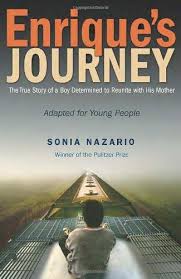by Deborah Dimmett
 There is an abundance of young adult (YA) literature that lends itself to exploring issues of social justice. Introducing young adults to nonfiction books about societal and global dilemmas can be a very exciting way to engage youth in problem-based learning through literature. One issue that has local, national, and global implications deals with huge influx of unaccompanied and undocumented children from Central America. This particular issue has directed new attention to Sonia Nazario’s nonfiction account of a Honduran boy, Enrique, who leaves on a dangerous quest to find his mother in the United States. Nazario, whose background is investigative journalism, began her research long before she decided to make the trek with Enrique atop La Bestia (the Beast), the notoriously dangerous train that thousands of children take, or attempt to take, each year to leave the dire situation in their homeland.
There is an abundance of young adult (YA) literature that lends itself to exploring issues of social justice. Introducing young adults to nonfiction books about societal and global dilemmas can be a very exciting way to engage youth in problem-based learning through literature. One issue that has local, national, and global implications deals with huge influx of unaccompanied and undocumented children from Central America. This particular issue has directed new attention to Sonia Nazario’s nonfiction account of a Honduran boy, Enrique, who leaves on a dangerous quest to find his mother in the United States. Nazario, whose background is investigative journalism, began her research long before she decided to make the trek with Enrique atop La Bestia (the Beast), the notoriously dangerous train that thousands of children take, or attempt to take, each year to leave the dire situation in their homeland.
Enrique’s Journey (2006), a Pulitzer Prize winner, has gained new interest with the recent emergence of thousands of unaccompanied and undocumented children who have come to the United States to escape the violence and terror brought about by drug gangs. PBS featured the children in a news program titled No Country for Lost Kids. Since 2012, the number of children coming to the United States has nearly doubled each year. In 2014, it is projected that 60,000 will successfully make it to the U.S. in hopes of finding a relative or guardian who they can stay with and attain some form of legal status. According to the report, for the first time most of the children are from Honduras, Guatemala, and El Salvador. A larger percent are girls under the age of 13.
Honduras, Guatemala, and El Salvador make up what is known as the three countries that together have the highest murder rates in the world, according to the United Nations Office on Drugs and Crime. The report states this is due to the smaller drug cartels that spilled over into theses countries after the crackdown by the Mexican army in 2006, forcing them to move into other countries bordering Mexico.
Enrique’s Journey can be combined with other informational texts to explore the current problems facing immigrant children and youth, like Enrique, who are now living in detention centers throughout the United States until they have had a hearing to determine their legal status. This opens discussions on whether or not the children and youth will be able to get refugee status and who would be responsible for them if they are allowed to stay in the U.S. And, if they are returned to their home country, what could happen to them and their family?
Note: Enrique’s Journey has recently been published as an adaptation for younger readers as well as published in eight languages, including Spanish.
Journey through Worlds of Words during our open reading hours: Monday-Friday, 9 a.m. to 5 p.m. and Saturday, 9 a.m. to 1 p.m. To view our complete offerings of WOW Currents, please visit archival stream.
- Themes: Deborah Dimmett, enrique's journey
- Descriptors: Books & Resources, Debates & Trends, WOW Currents

Engaging students in literature takes thought and relevance. The more they can interact with a real social issue, the more their eyes are open to the world beyond their own city limits.